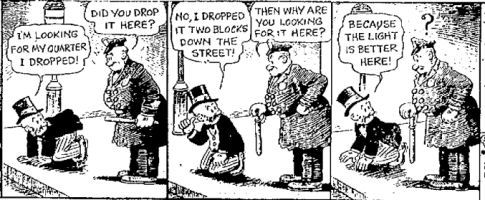Representative agent models and the streetlight effect Attempts to rationalize representative consumer models (especially for purposes other than social welfare measurement) may seem like a quixotic endeavor. Macroeconomists (and many applied microeconomists and econometricians) routinely assume the existence of one, seeing it as a necessary (though acceptable) evil required for the sake of tractability. Many mathematical economists are unwilling to accept the existence of any structure in macro demands. Some econometricians employ exact aggregation methods to specify macro demand equations, but reject any representative agent interpretation of the result as unnecessary if not erroneous. Representative consumer models are typically employed when one wants to ignore the complications caused by aggregation. As a result, those economists that do consider aggregation explicitly will tend to actively disparage representative consumer models, in part because doing so justifies their emphasis on aggregation issues. It is a fact that the use of a representative consumer assumption in most macro work is an illegitimate method of ignoring valid aggregation concerns. However, the representative consumer framework vastly simplifies a great deal of macro work and thought, and so is not likely to be abandoned.
Topics:
Lars Pålsson Syll considers the following as important: Economics
This could be interesting, too:
Lars Pålsson Syll writes Schuldenbremse bye bye
Lars Pålsson Syll writes What’s wrong with economics — a primer
Lars Pålsson Syll writes Krigskeynesianismens återkomst
Lars Pålsson Syll writes Finding Eigenvalues and Eigenvectors (student stuff)
Representative agent models and the streetlight effect
Attempts to rationalize representative consumer models (especially for purposes other than social welfare measurement) may seem like a quixotic endeavor. Macroeconomists (and many applied microeconomists and econometricians) routinely assume the existence of one, seeing it as a necessary (though acceptable) evil required for the sake of tractability. Many mathematical economists are unwilling to accept the existence of any structure in macro demands. Some econometricians employ exact aggregation methods to specify macro demand equations, but reject any representative agent interpretation of the result as unnecessary if not erroneous.
Representative consumer models are typically employed when one wants to ignore the complications caused by aggregation. As a result, those economists that do consider aggregation explicitly will tend to actively disparage representative consumer models, in part because doing so justifies their emphasis on aggregation issues.
It is a fact that the use of a representative consumer assumption in most macro work is an illegitimate method of ignoring valid aggregation concerns. However, the representative consumer framework vastly simplifies a great deal of macro work and thought, and so is not likely to be abandoned.

